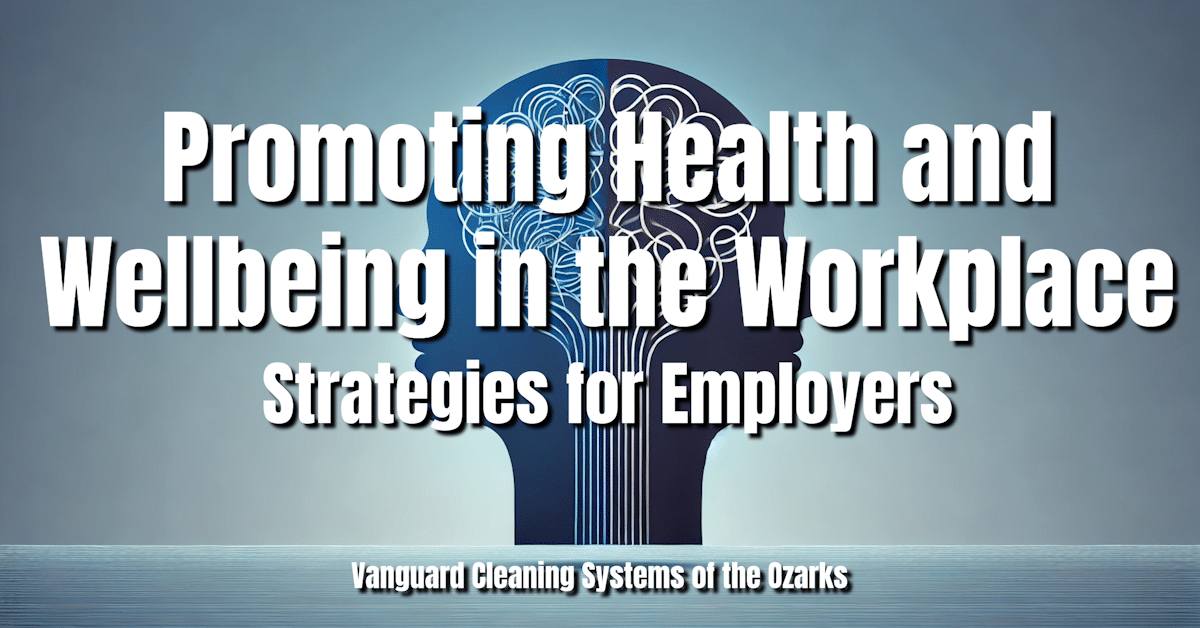Creating a healthy workplace isn't just a trend—it's a necessity for thriving businesses and happy employees.

Promoting Health and Well-Being in the Workplace: Strategies for Employers
The health and well-being of employees play a crucial role in any organization's overall success.
A focus on workplace health initiatives not only enhances productivity but also reduces absenteeism and healthcare costs.
Employers can create a supportive and thriving work environment by recognizing common workplace stressors and implementing effective health programs.
Prioritizing employee health leads to a more resilient, engaged, and satisfied workforce, contributing significantly to organizational success.
Recognizing the Need for Workplace Health Initiatives
Statistics and Studies
Understanding the scope of work-related health issues is the first step in addressing them. Studies show that work-related disorders are a significant concern, leading to decreased productivity, increased absenteeism, and higher healthcare costs. Awareness of these statistics can help employers prioritize health initiatives and allocate resources effectively.
Identifying Workplace Stressors
Workplace stressors come in various forms and can significantly impact employee health and productivity.
- Physical Stressors: These include repetitive movements, heavy lifting, and prolonged standing or sitting. Ensuring ergonomic workstations and providing regular breaks can mitigate these stressors.
- Mental Stressors: High job demands, lack of control over work, and poor work-life balance are common mental stressors. Implementing flexible work schedules and providing mental health resources can help reduce these pressures.
- Emotional Stressors: Workplace conflicts, job insecurity, and lack of support are emotional stressors that affect employee well-being. Fostering a supportive and communicative work environment can alleviate these issues.
Role of Management in Employee Health
Management plays a pivotal role in maintaining and promoting employee health.
- Supportive Management: Managers who are trained to recognize and address health concerns can create a positive work environment. Regular check-ins, open communication, and providing necessary resources are essential.
- Training Programs: Investing in training programs for managers to develop skills in identifying and addressing health issues can lead to better health outcomes and higher job satisfaction. Such programs should focus on empathy, active listening, and conflict resolution.
By recognizing these needs and implementing targeted strategies, employers can significantly improve workplace health and productivity.
Exploring Solutions and Strategies
Implementing Community Interventions
Employers can enhance workplace health through multifaceted community interventions.
- Multifaceted Approaches: Community-based interventions address various aspects of health, including physical, mental, and emotional well-being. Programs such as group fitness activities, mental health workshops, and social events can foster a sense of community and support among employees.
- Employee Engagement: Engaging employees in the design and implementation of health programs ensures that the interventions are relevant and effective. Encouraging employee feedback and participation can lead to higher program success rates.
Creating a Supportive Environment
A supportive work environment is crucial for employee well-being.
- Open Communication: Establishing channels for open communication allows employees to express their concerns and needs. Regular meetings, suggestion boxes, and anonymous surveys can facilitate this.
- Recognition Programs: Recognizing and rewarding employees for their contributions can boost morale and motivation. Implementing recognition programs, such as Employee of the Month, can create a positive and supportive atmosphere.
- Mental Health Resources: Providing access to mental health resources, such as counseling services and stress management workshops, supports employees' emotional well-being. Employers should ensure these resources are readily available and promote their use.
Managerial Training and Support Programs
Training managers to support employee well-being is essential for a healthy workplace.
- Managerial Training: Managers should be trained to recognize signs of stress and burnout in their teams. Training programs should cover topics such as mental health awareness, conflict resolution, and effective communication.
- Support Programs: Establishing support programs for managers helps them better assist their teams. These programs can include peer support groups, mentorship opportunities, and leadership development courses.
- Regular Feedback: Encouraging managers to seek regular feedback from their teams can help identify areas for improvement in their support strategies. This continuous feedback loop ensures that the support provided remains relevant and effective.
By exploring and implementing these solutions, employers can create a healthier and more supportive work environment for their employees.
Implementing Effective Programs
Developing Comprehensive Health Programs
Creating and implementing comprehensive health programs is a critical step in promoting workplace well-being.
Needs Assessment
- Conduct a thorough assessment to identify the specific health needs of your employees. This can include surveys, focus groups, and health risk assessments.
- Use the data collected to tailor programs that address the unique needs of your workforce.
Program Design
- Design programs that encompass physical, mental, and emotional health. This can include fitness challenges, mental health days, and wellness workshops.
- Ensure the programs are inclusive and accessible to all employees, regardless of their role or location.
Resource Allocation
- Allocate adequate resources for the successful implementation of health programs. This includes budget, personnel, and time.
- Partner with external health professionals and organizations to enhance the quality and reach of your programs.
Measuring Success and Adjusting Strategies
Regularly evaluating the effectiveness of health initiatives is essential for continuous improvement.
Key Performance Indicators (KPIs)
- Define clear KPIs to measure the success of health programs. This can include metrics such as employee participation rates, health outcomes, and productivity levels.
- Regularly monitor these KPIs to assess program impact.
Feedback Mechanisms
- Implement mechanisms for ongoing feedback from employees. Surveys, suggestion boxes, and focus groups can provide valuable insights into program effectiveness and areas for improvement.
- Use this feedback to make necessary adjustments to the programs.
Continuous Improvement
- Foster a culture of continuous improvement by regularly reviewing and updating health programs. Stay informed about new health trends and best practices.
- Encourage employee involvement in the improvement process to ensure programs remain relevant and effective.
Case Studies and Best Practices
Learning from successful implementations can provide valuable insights and guidance.
Successful Case Studies
- Highlight case studies of organizations that have successfully implemented comprehensive health programs. Share their strategies, challenges, and outcomes.
- Use these examples to inspire and guide your own implementation efforts.
Best Practices
- Identify and adopt best practices from industry leaders and health experts. This can include strategies for engaging employees, promoting program participation, and measuring success.
- Continuously benchmark your programs against these best practices to ensure high standards.
Employers can create a sustainable and effective approach to workplace health and well-being by developing comprehensive health programs, measuring their success, and learning from best practices.
References
- Kristman, V. L., Lowey, J., Fraser, L., Armstrong, S., & Sawula, S. (2019). A multi-faceted community intervention is associated with knowledge and standards of workplace mental health: the Superior Mental Wellness @ Work study. BMC Public Health, 19(1). https://doi.org/10.1186/s12889-019-6976-x
- Petrie, K., Gayed, A., Bryan, B. T., Deady, M., Madan, I., Savic, A., Wooldridge, Z., Counson, I., Calvo, R. A., Glozier, N., & Harvey, S. B. (2018). The importance of manager support for the mental health and well-being of ambulance personnel. PLOS ONE, 13(5), e0197802. https://doi.org/10.1371/journal.pone.0197802
- Kunyk, D., Craig-Broadwith, M., Morris, H., Diaz, R., Reisdorfer, E., & Wang, J. (2016). Employers’ perceptions and attitudes toward the Canadian national standard on psychological health and safety in the workplace: A qualitative study. International Journal of Law and Psychiatry, 44, 41–47. https://doi.org/10.1016/j.ijlp.2015.08.030
Takeaway
Recognizing and addressing workplace health and well-being is essential for fostering a productive and positive work environment.
By understanding the prevalence of work-related health issues and identifying key stressors, employers can lay the foundation for effective health initiatives.
Implementing comprehensive health programs, supported by a strong managerial commitment, can significantly enhance employee well-being.
Employers should focus on developing multifaceted community interventions, creating supportive environments, and investing in managerial training.
Regularly measuring the success of these initiatives and continuously improving them based on feedback and best practices will ensure their long-term effectiveness.
Taking proactive steps to promote workplace health benefits employees and leads to higher productivity, reduced absenteeism, and lower healthcare costs.
By prioritizing health and well-being, employers can build a resilient and engaged workforce, ultimately contributing to their organization's overall success.
Vanguard Cleaning Systems® of the Ozarks' franchise-owned custodial service provider business cleans more than 8M sq. ft. weekly, maintaining an industry topping 95+% of its customer base, year-over-year, and boasting more than 60 5-star Google reviews.
Need more capability from your vendor partners? --Let's talk.
In Oklahoma, dial 918-960-4450
In Arkansas, dial 479-717-2410
In Missouri, dial 417-812-9777

